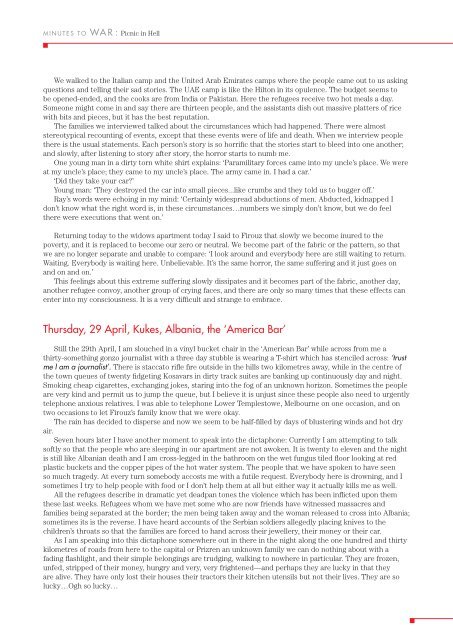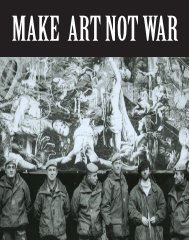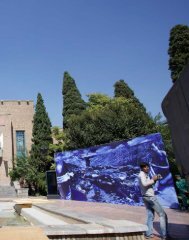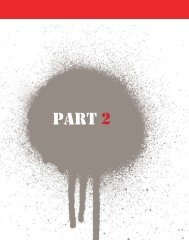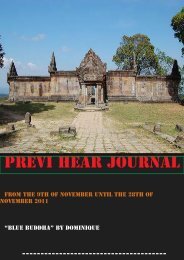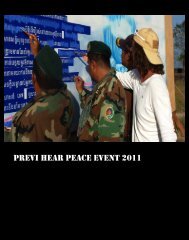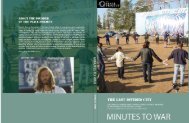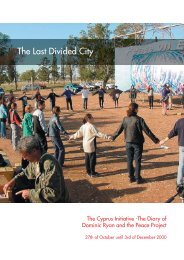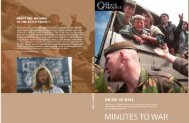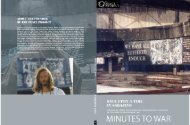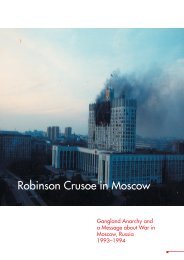Create successful ePaper yourself
Turn your PDF publications into a flip-book with our unique Google optimized e-Paper software.
M I N U T E S T O WA R : Picnic in Hell<br />
We walked to the Italian camp and the United Arab Emirates camps where the people came out to us asking<br />
questions and telling their sad stories. The UAE camp is like the Hilton in its opulence. The budget seems to<br />
be opened-ended, and the cooks are from India or Pakistan. Here the refugees receive two hot meals a day.<br />
Someone might come in and say there are thirteen people, and the assistants dish out massive platters of rice<br />
with bits and pieces, but it has the best reputation.<br />
The families we interviewed talked about the circumstances which had happened. There were almost<br />
stereotypical recounting of events, except that these events were of life and death. When we interview people<br />
there is the usual statements. Each person’s story is so horrific that the stories start to bleed into one another;<br />
and slowly, after listening to story after story, the horror starts to numb me.<br />
One young man in a dirty torn white shirt explains: ‘Paramilitary forces came into my uncle’s place. We were<br />
at my uncle’s place; they came to my uncle’s place. The army came in. I had a car.’<br />
‘Did they take your car?’<br />
Young man: ‘They destroyed the car into small pieces...like crumbs and they told us to bugger off.’<br />
Ray’s words were echoing in my mind: ‘Certainly widespread abductions of men. Abducted, kidnapped I<br />
don’t know what the right word is, in these circumstances…numbers we simply don’t know, but we do feel<br />
there were executions that went on.’<br />
Returning today to the widows apartment today I said to Firouz that slowly we become inured to the<br />
poverty, and it is replaced to become our zero or neutral. We become part of the fabric or the pattern, so that<br />
we are no longer separate and unable to compare: ‘I look around and everybody here are still waiting to return.<br />
Waiting. Everybody is waiting here. Unbelievable. It’s the same horror, the same suffering and it just goes on<br />
and on and on.’<br />
This feelings about this extreme suffering slowly dissipates and it becomes part of the fabric, another day,<br />
another refugee convoy, another group of crying faces, and there are only so many times that these effects can<br />
enter into my consciousness. It is a very difficult and strange to embrace.<br />
Thursday, 29 April, Kukes, Albania, the ‘America Bar’<br />
Still the 29th April, I am slouched in a vinyl bucket chair in the ‘American Bar’ while across from me a<br />
thirty-something gonzo journalist with a three day stubble is wearing a T-shirt which has stenciled across: ‘trust<br />
me I am a journalist’. There is staccato rifle fire outside in the hills two kilometres away, while in the centre of<br />
the town queues of twenty fidgeting Kosavars in dirty track suites are banking up continuously day and night.<br />
Smoking cheap cigarettes, exchanging jokes, staring into the fog of an unknown horizon. Sometimes the people<br />
are very kind and permit us to jump the queue, but I believe it is unjust since these people also need to urgently<br />
telephone anxious relatives. I was able to telephone Lower Templestowe, Melbourne on one occasion, and on<br />
two occasions to let Firouz’s family know that we were okay.<br />
The rain has decided to disperse and now we seem to be half-filled by days of blustering winds and hot dry<br />
air.<br />
Seven hours later I have another moment to speak into the dictaphone: Currently I am attempting to talk<br />
softly so that the people who are sleeping in our apartment are not awoken. It is twenty to eleven and the night<br />
is still like Albanian death and I am cross-legged in the bathroom on the wet fungus tiled floor looking at red<br />
plastic buckets and the copper pipes of the hot water system. The people that we have spoken to have seen<br />
so much tragedy. At every turn somebody accosts me with a futile request. Everybody here is drowning, and I<br />
sometimes I try to help people with food or I don’t help them at all but either way it actually kills me as well.<br />
All the refugees describe in dramatic yet deadpan tones the violence which has been inflicted upon them<br />
these last weeks. Refugees whom we have met some who are now friends have witnessed massacres and<br />
families being separated at the border; the men being taken away and the woman released to cross into Albania;<br />
sometimes its is the reverse. I have heard accounts of the Serbian soldiers allegedly placing knives to the<br />
children’s throats so that the families are forced to hand across their jewellery, their money or their car.<br />
As I am speaking into this dictaphone somewhere out in there in the night along the one hundred and thirty<br />
kilometres of roads from here to the capital or Prizren an unknown family we can do nothing about with a<br />
fading flashlight, and their simple belongings are trudging, walking to nowhere in particular. They are frozen,<br />
unfed, stripped of their money, hungry and very, very frightened—and perhaps they are lucky in that they<br />
are alive. They have only lost their houses their tractors their kitchen utensils but not their lives. They are so<br />
lucky…Ogh so lucky…


